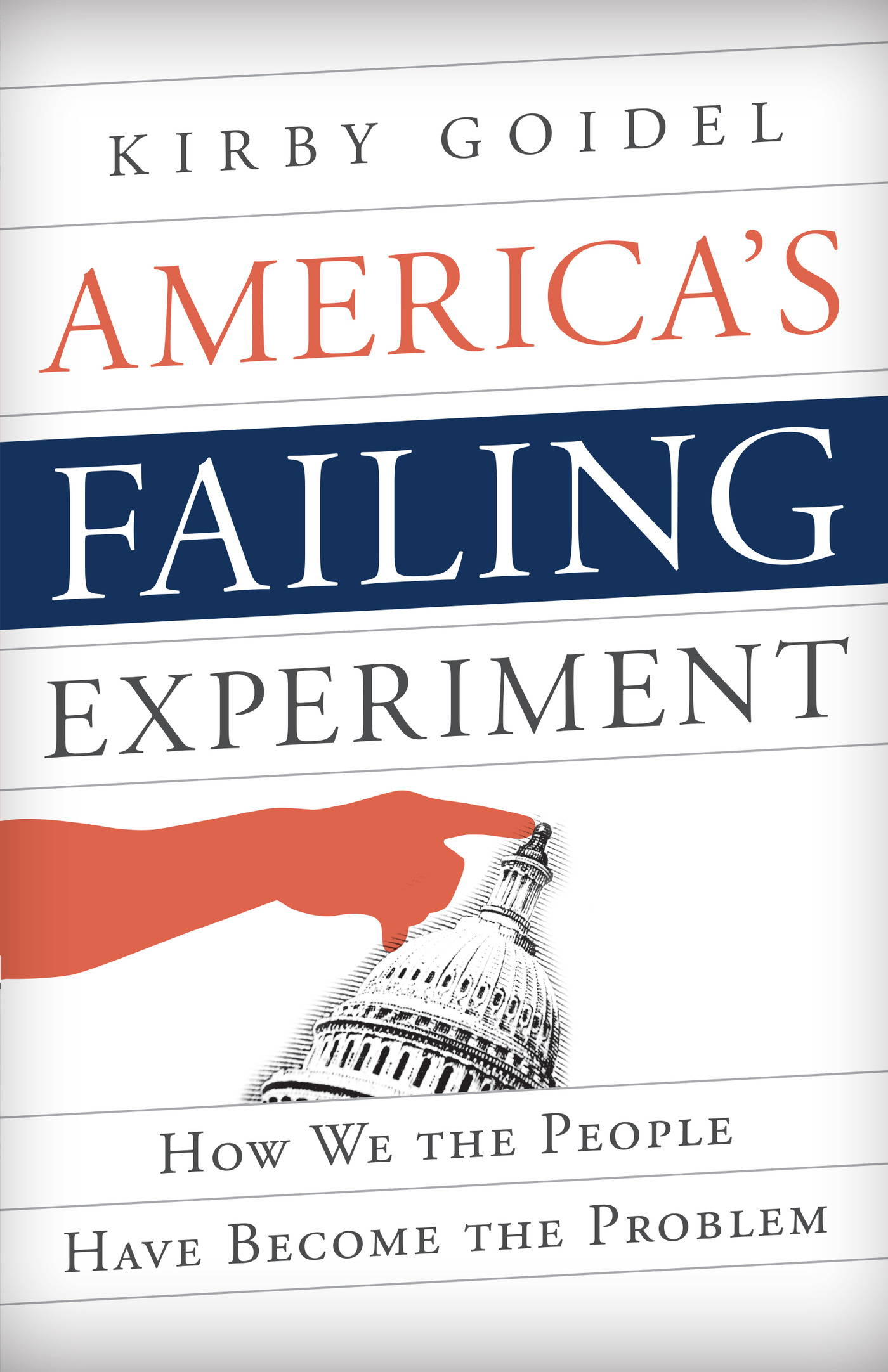Americas Failing
Experiment
Americas Failing
Experiment
How We the People
Have Become the Problem
Kirby Goidel
ROWMAN & LITTLEFIELD
Lanham Boulder New York London
Published by Rowman & Littlefield
A wholly owned subsidiary of The Rowman & Littlefield Publishing Group, Inc.
4501 Forbes Boulevard, Suite 200, Lanham, Maryland 20706
www.rowman.com
Unit A, Whitacre Mews, 26-34 Stannary Street, London SE11 4AB
Copyright 2014 by Rowman & Littlefield
First paperback edition 2015
All rights reserved. No part of this book may be reproduced in any form or by any electronic or mechanical means, including information storage and retrieval systems, without written permission from the publisher, except by a reviewer who may quote passages in a review.
British Library Cataloguing in Publication Information Available
Library of Congress Cataloging-in-Publication Data
The hardback edition of this book was previously catalogued by the Library of Congress as follows:
Goidel, Robert K., 1967
Americas failing experiment : how we the people have become the problem / Kirby Goidel.
pages cm
Includes index.
1. DemocracyUnited StatesCitizen participation. 2. Political participationUnited States. 3. Political cultureUnited States. 4. United StatesPolitics and government21st century. I. Title.
JK1764.G66 2014
320.973dc23
2013031601
ISBN 978-1-4422-2650-0 (cloth : alk. paper)
ISBN 978-1-4422-4750-5 (pbk. : alk. paper)
ISBN 978-1-4422-2651-7 (electronic)
 TM The paper used in this publication meets the minimum requirements of American National Standard for Information Sciences Permanence of Paper for Printed Library Materials, ANSI/NISO Z39.48-1992.
TM The paper used in this publication meets the minimum requirements of American National Standard for Information Sciences Permanence of Paper for Printed Library Materials, ANSI/NISO Z39.48-1992.
Printed in the United States of America
Acknowledgments
This book would have been unthinkable without the influence of two professors, very different in style, but both incredibly impactful. Neither bears responsibility for any of the conclusions drawn here. Indeed, I imagine (and hope) each would take issue with the arguments put forward in this text.
I had the good fortune to stumble into Tony Eksterowiczs American government course as a directionless but intellectually curious psychology major circa 1986. After a handful of lectures, I was hooked. His probing questions about the effectiveness of democratic governance, the responsibilities of democratic citizenship, and the possibilities for reform have been a constant refrain in all of my teaching and research.
Don Gross similarly saved me from law school when he called and offered a teaching assistantship at the University of Kentucky in 1989. I gladly accepted. Don is a talented quantitative scholar, but he relishes asking difficult, often uncomfortable, and frequently unanswerable questions.
I also owe special thanks to Adrienne Moore, the former director of the Reilly Center for Media & Public Affairs at Louisiana State University. Adrienne continues to believe that scholarship should be about big ideas and real-world consequences. Adrienne supported this project from its inception, read various drafts along the way, and offered timely words of encouragement.
Thanks are also due to Johanna Dunaway, Ashley Kirzinger, Jason Turcotte, Tony Eksterowicz, and Keith Gaddie for reading earlier drafts of the manuscript and offering suggestions, corrections, and criticisms. The mistakes that remain are my own. My neighbor and friend Andy Redpath similarly agreed to read an early draft and offered suggestions for improving the books appeal beyond academic audiences.
My greatest thanks are, of course, reserved for my family. My parents, Don and Lou Goidel, always encouraged political debate and discussion, igniting a lifelong interest in politics. They taught me to carefully weigh evidence and reach independent decisions. My wife, Beth, tolerated my sabbatical with good humor and patience (though she also vowed that I am never allowed to retire). Most of all, this book is for my kids, Hannah and Spencer, who have learned to deal with my distractions and obsessions. I hope it makes them proud.
Introduction
We Are the Problem
This is a book about the failure of American democracy. And, lets be honest, American democracy is failing. We are unable to address our most pressing problems, unwilling to plan, think, or invest beyond the next election cycle, and seemingly unable or unwilling to correct our current course. This is not just a problem of our elected officials. They are not, as is commonly believed, out of touch. If anything, they are too responsive to public opinion and interest group pressures. Nor are they intellectually or morally inferior to the elected officials of the past. They are no more incompetent than our elected representatives from the 1950s, 1920s, 1890s, or 1800s. Indeed, they are likely less corrupt, better educated, and more professional than politicians in the past. Tip ONeill, a former speaker of the House who served in Congress from 1952 to 1985, captured the problem elegantly when asked about the differences between the Congress when we he began his career in the 1950s relative to the Congress when he ended his career in the 1980s. The people are better, ONeill explained. The results are worse.
It is a widely held misconception that if we could simply throw out all the bums and start all over, our politics would be purified and cleansed. An NBC/Wall Street Journal poll conducted in August 2011, for example, found that 54 percent of Americans would vote to defeat and replace every single member of Congress, including their own representative. The problem, according to this view, is not the system but the people who run it. In a milder form, this misconception is expressed in support of replacing professional politicians and their expertise with regular people with everyday common sense: the citizen legislator idealized by reformers advocating term limits and campaign finance reform. More subtly, it influences how politicians portray themselves and cast their opposition. George W. Bush, a graduate of Yale University and the Harvard Business School, portrayed Harvard graduates Al Gore and John Kerry as elitists. Sarah Palins everywoman appeal was similarly an embodiment of a deeper public sentiment for leadership from everyday people with core values. In contemporary politics, there is a palpable desire for commonsense solutions and a price to be paid for appearing too smart.
Oddly, and perhaps ironically, the deep disaffection from the current crop of elected officials hardly affects public support for the political system more broadly defined. Tea Party adherents give the U.S. Constitution nearly religious reverence even as they hold public officials (especially Democrats and moderate Republicans) and politics in great disdain. The failures of contemporary politics, according to this view, are rooted in departures from our original constitutional design and a lack of fidelity to the original intent of the Founding Fathers. If we return to our constitutional originsso the thinking goesall will be well. Such thinking, of course, ignores the actual history in favor of mythology. Historical accounts illustrate the Founding Fathers were of not like minds at the time of the Constitutions drafting, as they disagreed strongly on many of the Constitutions key provisions. James Madison, often described as the Constitutions chief architect, altered his interpretations as the political context shifted from the early drafting of the Constitution and the Washington administration to his alliance with Thomas Jefferson and the formation of the Democratic-Republican Party.
Next page
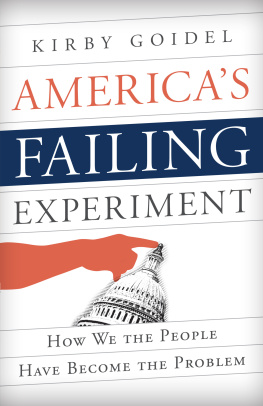

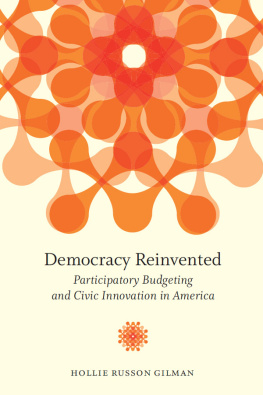
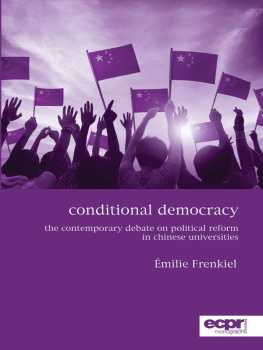
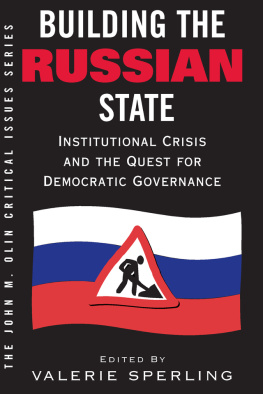
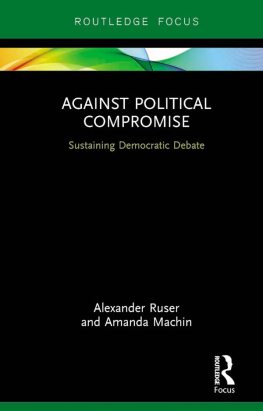
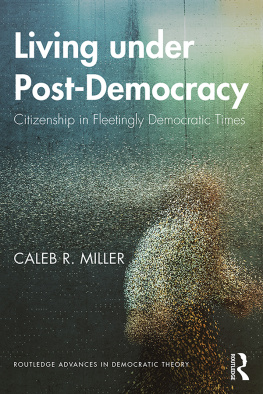

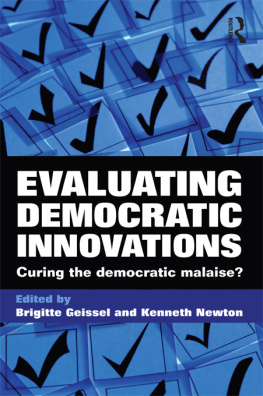
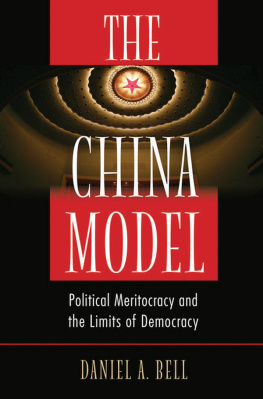
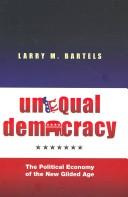
 TM The paper used in this publication meets the minimum requirements of American National Standard for Information Sciences Permanence of Paper for Printed Library Materials, ANSI/NISO Z39.48-1992.
TM The paper used in this publication meets the minimum requirements of American National Standard for Information Sciences Permanence of Paper for Printed Library Materials, ANSI/NISO Z39.48-1992.